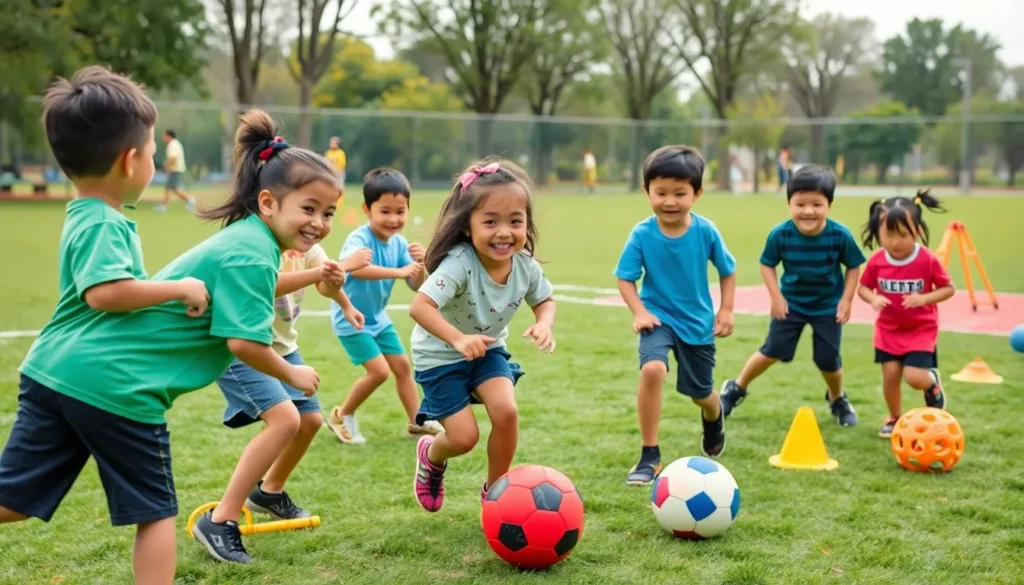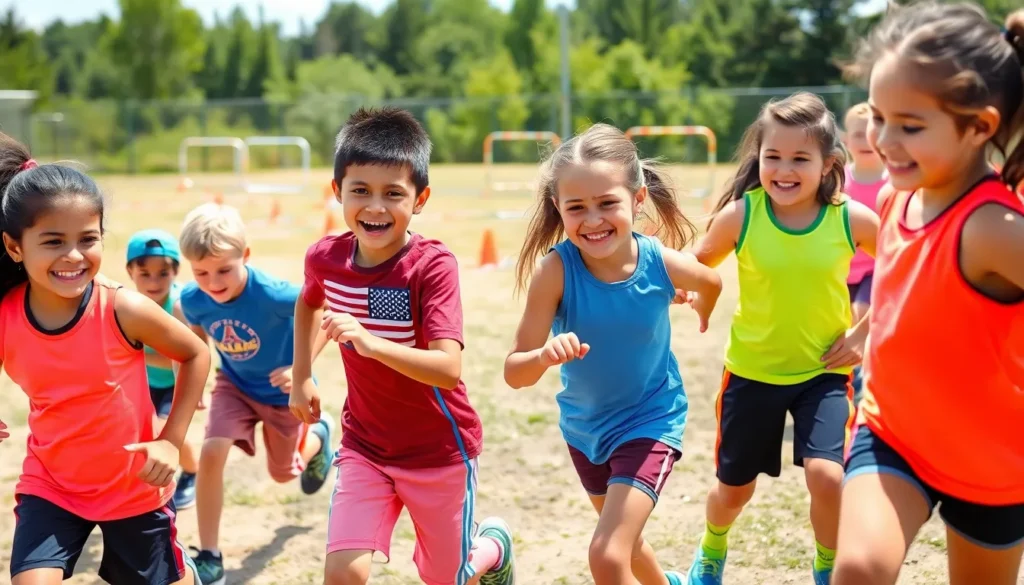Table of Contents
ToggleIn a world where kids are glued to screens more than ever, sports workshops are the perfect antidote. Imagine a place where they can unleash their inner athlete while making friends and learning valuable skills. It’s like a playground, but with a mission! These workshops not only keep kids active but also teach teamwork, discipline, and resilience—all while having a blast.
Overview of Sports Workshops for Kids
Sports workshops for kids offer numerous opportunities to foster physical fitness and social skills. In these workshops, children participate in various activities that encourage movement and creativity. The structured environment promotes a sense of belonging while providing a break from screen time.
Engagement in these workshops leads to improvements in teamwork and communication. Kids learn to collaborate through team sports like soccer and basketball. Through these experiences, they gain essential life lessons on cooperation and support.
Development of motor skills happens in a playful setting. Activities such as obstacle courses and relay races help enhance agility and coordination. Progress in physical abilities boosts children’s confidence and self-esteem.
Safety in sports workshops remains a priority. Qualified instructors ensure that activities are appropriate for different age groups. Their guidance guarantees a fun experience while minimizing the risk of injury.
The social aspect of sports workshops cannot be overlooked. Children form friendships and develop social networks that extend beyond the workshop. Positive interactions help combat feelings of isolation and anxiety.
Workshops may also incorporate educational components related to health and nutrition. Participants learn about the importance of a balanced diet alongside regular physical activity. This holistic approach forms a foundation for a healthy lifestyle as kids grow.
Children of all skill levels can benefit from these workshops. Inclusive activities cater to varying abilities, promoting diversity and acceptance. Focus remains on personal growth rather than competition, creating an inviting atmosphere.
Ultimately, sports workshops for kids play a crucial role in fostering well-rounded individuals. They provide an engaging outlet for physical activity while promoting social connections and life skills.
Benefits of Sports Workshops for Kids


Sports workshops provide children with multiple benefits that support their overall growth. These workshops emphasize physical development and social skills enhancement.
Physical Development
Physical development occurs through various activities tailored for kids. Workshops improve motor skills by engaging participants in different sports and exercises. Children increase agility through fun obstacle courses while enhancing coordination via relay races. Regular participation boosts fitness levels, which contributes to healthier lifestyles. Weight management can also be achieved as kids become more active. Working with qualified instructors ensures that activities align with developmental stages, promoting safe practices. Confidence and self-esteem improves as kids accomplish physical challenges.
Social Skills Enhancement
Social skills enhancement takes place during teamwork-driven activities. Workshops facilitate friendships among peers as they collaborate in sports. Children learn the importance of communication and cooperation, particularly through team-based games. Additionally, the structured setting helps kids overcome feelings of isolation. Encouraging positive interactions builds a support network that fosters emotional well-being. Workshops focus on inclusivity, allowing kids of all abilities to participate. Personal growth is prioritized over competition, making everyone feel valued and appreciated.
Types of Sports Workshops
Sports workshops for kids offer various formats, catering to different interests and skills. These workshops can focus on teamwork or individual achievements, ensuring every child finds a suitable option.
Team Sports Workshops
Team sports workshops emphasize collaboration and unity. Activities include soccer, basketball, and baseball. Children learn to communicate effectively and work together towards common goals. Workshops often feature drills that enhance teamwork skills and strategic play. Engaging with peers builds lasting friendships, reducing feelings of isolation. Instructors tailor sessions to foster inclusion, catering to all skill levels. Through friendly competition, kids experience motivation and accountability, leading to personal growth.
Individual Sports Workshops
Individual sports workshops showcase personal athleticism. Options include tennis, swimming, and gymnastics. These workshops encourage self-discipline, focus, and determination. Children receive personalized attention from instructors, allowing for targeted skill development. Participants often set personal goals, fostering a sense of achievement. Workshops incorporate physical fitness activities to improve strength and flexibility. Kids thrive in a supportive environment where they can express their individuality. Overall, these workshops promote self-confidence, encouraging children to pursue their interests and passions independently.
Selecting the Right Sports Workshop
Choosing the appropriate sports workshop plays a crucial role in a child’s development. Age and skill level must align with workshop offerings to ensure a positive experience.
Age Considerations
Age significantly impacts participation in sports workshops. Programs typically target specific age ranges, catering to developmental stages. For children aged 5 to 7, introductory workshops foster basic coordination and motor skills. In contrast, workshops for older kids, such as ages 8 to 12, often emphasize teamwork and strategic play. Older children excel in environments that challenge their skills and encourage competition. Selecting workshops designed for specific ages ensures that children interact and progress with peers facing similar developmental milestones.
Skill Level Factors
Skill level also influences workshop choices. Beginners require a nurturing atmosphere to build confidence and fundamental skills. Intermediate workshops invite children to refine techniques while gaining competitive experience. Advanced programs cater to more proficient athletes, focusing on enhancing performance and tactical understanding. Workshops must assess skill levels during enrollment, ensuring appropriate group placement. Targeted instruction based on ability encourages growth and fosters continued interest in sports. Selecting workshops that match a child’s skill level creates a balanced learning environment, optimizing their potential.
Engaging in sports workshops offers children a unique opportunity to grow physically and socially. These programs not only promote fitness but also instill essential life skills that will benefit them in various aspects of life. By participating in team and individual sports, kids learn the value of collaboration, discipline, and resilience.
The supportive environment of these workshops fosters friendships and helps combat feelings of isolation. With qualified instructors guiding age-appropriate activities, children can safely explore their athletic potential. Choosing the right workshop tailored to a child’s age and skill level ensures a fulfilling experience that encourages personal growth. Ultimately, sports workshops are a valuable investment in a child’s overall development and well-being.





